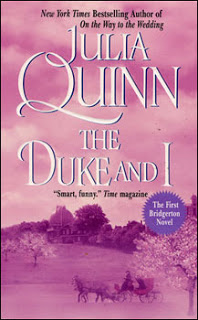One of the most prominent features in historical romance novels is the need for the titled to procreate. Duty dictates that they secure their line by having at least one son, though it’s preferable to have two (an heir and a spare).
 In The Duke and I, the issue of procreation is even more prominent, though for a different reason. In this case, Simon, the duke, doesn’t wish to ever have children. Because of the coldness with which his father treated him, he sees this as the ultimate payback to his dead father. By ensuring the line dies with him, he feels he’ll be winning at last.
In The Duke and I, the issue of procreation is even more prominent, though for a different reason. In this case, Simon, the duke, doesn’t wish to ever have children. Because of the coldness with which his father treated him, he sees this as the ultimate payback to his dead father. By ensuring the line dies with him, he feels he’ll be winning at last.
Daphne wants a husband and children more than anything. When they’re compromised, Simon chooses to engage in a duel with Daphne’s brother rather than marry her, because he knows she wants children and he refuses to sire them. Daphne agrees to marry him anyway, not realizing it isn’t that he’s not capable of having children, just that he’s choosing not to.
When she realizes he’s been spilling his seed outside her to ensure they have no children, she’s understandably upset. Because of her lack of knowledge about the marriage bed, she feels not only betrayed by him for his part in making her believe he was incapable of siring children, but she also feels ridiculously stupid.
“You lied to me.”
“I never—”
“You lied to me,” she screamed. “You lied to me, and I will never forgive you for that!”
“Daphne—”
“You took advantage of my stupidity.” She let out a disbelieving breath, the kind that came from the back of one’s throat, right before it closed up in shock. “You must have been so delighted when you realized how little I knew about marital relations.”
“It’s called making love, Daphne,” he said.
“Not between us, it’s not.”
[…]
“But don’t try to make this about me,” she continued hotly. “I’m not the one who lied. You said you can’t have children,
but the truth is you just won’t have them.”
He said nothing, but he knew the answer was in his eyes.
Until that moment, Daphne didn’t realize Simon’s resentment toward his father. Nor did she understand that depth of his anger – his hurt- because of the actions of a man who is long dead.
“He said he couldn’t even b-bear to look at me. He’d spent years praying for an heir. Not a son,” he said, his voice rising dangerously, “an heir. And f-for what? Hastings would go to a half-wit. His precious dukedom would b-be ruled by an idiot!”
“But he was wrong,” Daphne whispered.
“I don’t care if he was wrong!” Simon roared. “All he cared about was the title. He never gave a single thought to me, about how I must feel, trapped with a m-mouth that didn’t w-work!”
Daphne stumbled back a step, unsteady in the presence of such anger. This was the fury of decades-old resentment.
Simon very suddenly stepped forward and pressed his face very close to hers. “But do you know what?” he asked in an awful voice. “I shall have the last laugh. He thought that there could be nothing worse than Hastings going to a half-wit—”
“Simon, you’re not—”
“Are you even listening to me?” he thundered.
Daphne, frightened now, scurried back, her hand reaching for the doorknob in case she needed to escape.
“Of course I know I’m not an idiot,” he spat out, “and in the end, I think h-he knew it, too. And I’m sure that brought him g-great comfort. Hastings was safe. N-never mind that I was not suffering as I once had. Hastings— that’s what mattered.”
Daphne felt sick. She knew what was coming next.
Simon suddenly smiled. It was a cruel, hard expression, one she’d never seen on his face before. “But Hastings dies with me,” he said.” All those cousins he was so worried about inheriting …” He shrugged and let out a brittle laugh. “They all had girls. Isn’t that something?” Simon shrugged. “Maybe that was why my f-father suddenly decided I wasn’t such an idiot. He knew I was his only hope.”
The next day, Daphne tries to reason with Simon again.
“You told me you couldn’t have children,” she interrupted, her eyes flashing with anger. “There’s a very big difference.”
“Not,” Simon said coldly, “to me. I can’t have children. My soul won’t allow it.”
“I see.” Something shriveled inside Daphne at that moment, and she was very much afraid it was her heart. She didn’t know how she was meant to argue with such a statement. Simon’s hatred of his father was clearly far stronger than any love he might learn to feel for her.
“Very well,” she said in a clipped voice. “This is obviously not a subject upon which you are open to discussion.”
He gave her one curt nod.
She gave him one in return. “Good day, then.”
And she left.
Simon spends the day alternately feeling guilty for hurting Daphne and resentful of her for making him feel something he never wanted to feel. Until he finally decides he has nothing to feel guilty for. He didn’t truly deceive her; he told her he couldn’t have children before they wed. He gave her the option of finding someone else, and she chose him. Feeling much better, he seeks her out. Only he doesn’t find her in their bedroom. He finds her ensconced in a room down the hall.
Her eyes narrowed to slits. “You have chosen to withhold something from me. Well, I have chosen to withhold something from you. Me.”
He was speechless. Utterly speechless.
She, however, was not. She marched to the door and motioned rather rudely for him to go through it.
“Get out of my room.”
Simon goes out and gets drunk. While in his cups, he decides he wants Daphne back and charges back home to her. He stumbles into her room and they have a discussion – of sorts – where Daphne realizes her husband is far more damaged by his father than she’d ever thought. She tries to explain that he has won, just by growing into the man he is, but he’s beyond reason.
Daphne swallowed a heavy sob of frustration. She didn’t see how he could possibly lead a happy life if all of his choices were based on thwarting the wishes of a dead man.
But she didn’t want to get into all of that just then. She was tired and he was drunk and this just wasn’t the right time.
“Let’s get you to bed,” she finally said.
He stared at her for a long moment, his eyes filling with an ages-old need for comfort. “Don’t leave me,” he whispered.
“Simon,” she choked out.
“Please don’t. He left. Everyone left. Then I left.” He squeezed her hand. “You stay.”
She nodded shakily and rose to her feet. “You can sleep it off in my bed,” she said. “I’m sure you’ll feel better in the morning.”
“But you’ll stay with me?”
It was a mistake. She knew it was a mistake, but still she said, “I’ll stay with you.”
“Good.” He wobbled himself upright. “Because I couldn’t—I really—” He sighed and turned anguished eyes to her.
“I need you.”
They went to sleep. An hour later Daphne wakes up to find an aroused Simon beside her.
He shifted restlessly, and Daphne felt the strangest, most intoxicating surge of power. He was in her control, she realized. He was asleep, and probably still more than a little bit drunk, and she could do whatever she wanted with him.
She could have whatever she wanted.
[…]
And God help her, but she wanted him, too. She felt so powerful looming over him. She was in control, and that was the most stunning aphrodisiac she could imagine. She felt a fluttering in her stomach, then a strange sort of quickening, and she knew that she needed him.
She wanted him inside her, filling her, giving her everything a man was meant to give to a woman.
[…]
She was close, but not as close as he was.
“Oh, Christ!” he suddenly burst out, his voice harsh and primitive with need. “I’m going to—I can’t—”
His eyes pinned upon her with a strange, pleading sort of look, and he made a feeble attempt to pull away.
Daphne bore down on him with all her might.
He exploded within her, the force of his climax lifting his hips off the bed, pushing her up along with him.
She planted her hands underneath him, using all of her strength to hold him against her. She would not lose him this time. She would not lose this chance.
Simon’s eyes flew open as he came, as he realized too late what he had done. But his body was too far gone; there was no stopping the power of his climax. If he’d been on top, he might have found the strength to pull away, but lying there under her, watching her tease her own body into a mass of desire, he was helpless against the raging force of his own need.
As his teeth clenched and his body bucked, he felt her small hands slip underneath him, pressing him more tightly against the cradle of her womb. He saw the expression of pure ecstasy on her face, and then he suddenly realized—she had done this on purpose. She had planned this.
Daphne had aroused him in his sleep, taken advantage of him while he was still slightly intoxicated, and held him to her while he poured his seed into her.
Later Daphne would tell herself she didn’t truly know what she was doing. She could hardly be responsible for her actions in that moment, as she was just as aroused as he. Yet they both know the truth.
When Simon confronts her, he is reduced to the young, stuttering lad his father had shunned. He may have been able to forgive her for stealing his seed, but he can’t forgive her pushing him to lose control of his speech.
The debate, naturally, is who was in the wrong, Simon or Daphne. Was Daphne justified in stealing Simon’s sperm? He had, after all, deceived her prior to their marriage. Or, if not deceived, certainly took advantage of her ignorance of the marriage bed. By nursing his anger and refusing to sire children, he was, in fact, letting his father win. As long as he refused to acknowledged that, he’d never be out from under his father’s thumb, no matter how long dead the older man was.
Yet Simon had been, if not quite honest, at least forthcoming with Daphne. He told her prior to his marriage that he couldn’t have children. Should it matter that it wasn’t a physical disability but an emotional one? Was she right to seduce him while he was intoxicated, to take what she knew he didn’t want her to have? Wasn’t it a form of rape for her to steal something so intimate from him?
What do you think? Who bears the brunt of the blame? Simon for taking advantage of Daphne’s ignorance? Or Daphne for taking advantage of Simon while he was intoxicated?
Holly: For my part, I fully blame Daphne. I don’t excuse Simon’s behavior. He definitely needed to let go of his anger and resentment. As Daphne said, he was letting his father control him from the grave.
But the way to get him to realize that was not by raping him and stealing his sperm. If she’d shown some remorse, perhaps I could have forgiven her. As it stands, I felt she was selfish and childish. She violated Simon in the most basic of ways, and never once felt remorse. She continues to hold onto her righteous indignation until he apologizes to her. And even then she isn’t sorry for what she did.
Not only that, but she later tries to tell herself she didn’t really mean to steal his sperm. Which we all know, because she wasn’t intoxicated, is not the case. She fully meant to get his seed when she started. I’ve never been able to forgive her for that.
We’ll be discussing TDaI all month long. You’re welcome to join in the discussion at any time.
This book is available from Avon. You can buy it here or here in e-format.
 Reviewer: Rowena
Reviewer: Rowena 













